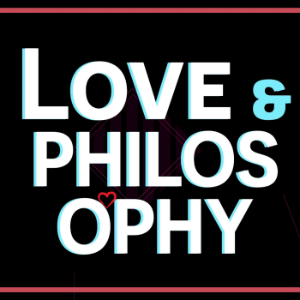
Love & Philosophy
Philosophy Podcasts
Exploring philosophical, scientific, technological & poetic spaces beyond either/or bounds. Living into the questions. Loving as knowing. Paradox as portal.
By love and philosophy we mean the people, passions, and ideas that move us, shape the trajectories of our lives, and co-create our wider landscapes.
Thank you for supporting this experiment. It really helps.
#waymaking #navigability #love #philosophy #learning #development #loveandphilosophy #andreahiott #metaphysics #paradox #systemsthinking #paradoxicalthinking #thinkingparadoxically #philosophyofmind
Location:
United States
Genres:
Philosophy Podcasts
Description:
Exploring philosophical, scientific, technological & poetic spaces beyond either/or bounds. Living into the questions. Loving as knowing. Paradox as portal. By love and philosophy we mean the people, passions, and ideas that move us, shape the trajectories of our lives, and co-create our wider landscapes. Thank you for supporting this experiment. It really helps. #waymaking #navigability #love #philosophy #learning #development #loveandphilosophy #andreahiott #metaphysics #paradox #systemsthinking #paradoxicalthinking #thinkingparadoxically #philosophyofmind
Language:
English
#67: Autonomy, Autopoiesis & the Enactive Approach with philosopher Ezequiel Di Paolo
Duration:01:12:51
#66 Harmonizing the Dao with analytic philosopher Eric Schwitzgebel
Duration:01:23:20
#65 Play & Meaningful Uncertainty: Active Inference and Intellectual Sweet Spots with Julian Kiverstein of Amsterdam UMC
Duration:01:23:45
#64: Complimentary Science & the Lure of Convenience with philosopher of technology Sabina Leonelli and Fotis Tsiroukis
Duration:01:25:56
#63 Shaping Habits Together: life's changes and challenges with cognitive scientist Mark Michael James
Duration:01:49:26
#62: Living philosophically and Thinking Wild with professor of technology Jessica Böhme
Duration:01:08:59
#61: Burning to Give Light: the delicate balance of illness and insight with former Wall Streeter Tom Morgan
Duration:01:27:14
#60: The Dao of Complexity with theoretical physicist Jean Boulton
Duration:01:12:42
#59: Complexity Coding, Residuality Theory & the Hyperliminal: being flexible and rigid at once with architect Barry O'Reilly
Duration:01:22:19
#58: Hill Making & Lessons for Living with WIRED co-founder Kevin Kelly
Duration:01:03:46
#57: Complexity Fatigue & the Third Entity with philosophers and neuroscientists Beck Todd, Shay Welch and Penijean Gracefire
Duration:01:43:48
BONUS: A Quick Podcast about Podcast(s) with Andrea & Fotis
Duration:00:35:53
#56: Radical Incompleteness & Windows of Ritournelle with poet philosopher Bayo Akomolafe
Duration:00:39:35
#55: How Shall we Live? with anthropologist and lineologist Tim Ingold
Duration:01:39:32
#54: Project Love: What We Make & How it Makes Us with service designer Clive Grinyer
Duration:01:06:37
#53: Another Needful Freedom: Truth in Tension with Mike Brock, ex-tech-exec, reluctant Cassandra
Duration:02:56:24
#52: We Are Not Machines! Agency & Science beyond Computationalism with Fotis and Yogi (Johannes Jaeger)
Duration:01:35:54
#51: Body Knowledge with philosophers Shay Welch and Elena Cuffari
Duration:01:17:23
#50: Love and Liberation in Times of Crisis with philosopher Rupert Read (and Wittgenstein)
Duration:01:25:16
#49: Empowerment in Robotics: Solo Brainstorm & AI Bonus Conversation with Dari Trendafilov
Duration:01:15:10